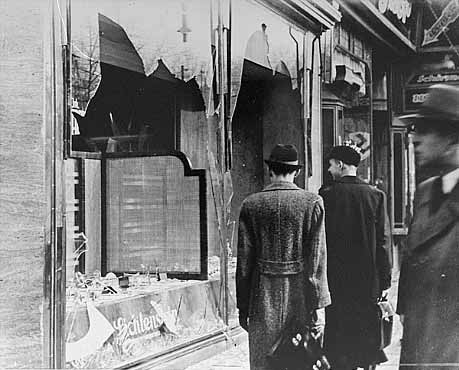


Tears glistened in the corner of his blue eyes. These eyes were almost owl-like, magnified through his thick glasses in the light of a street lamp. His grey hair was covered by a kippa, a traditional Jewish headdress.
Looking into his sad eyes, I felt the pain he carried with him throughout his life when he told me after the commemoration ceremony what happened to him and his family one brutal night.
On the night of Nov. 9, 1938, Jewish people across Germany were beaten, transported and killed by the Nazis. Windows from their houses and businesses shattered, synagogues went up in flames.
Every year German communities come together on the evening of Nov. 9 to commemorate the victims of Crystal Night. During the pogrom, 91 Jews were killed and 26,000 were transported to concentration camps. But the pogroms are not only important for Germans to remember.
“These things can and do happen all the time,” said Julia Torrie, chair of the history department at STU.
“Any case of injustice deserves our attention… This one is one we know about because it happened in a fairly recent past. There are certainly people whose parents have been affected [by the pogroms] probably living in Canada today.”
Torrie said the pogroms were key moments of people’s understanding of what was happening in Germany at the time.
Earlier in 1938, the Nazis put a series of laws in place depriving Jewish citizens of their rights. In June, Jewish enterprises had to be marked so everybody knew the owners were Jewish. In July, the Nazis cancelled Jewish doctors’ licenses to practice medicine. Jewish lawyers couldn’t work starting in September. A few weeks before Nov. 9, the Nazis confiscated Jews’ passports and issued new, clearly distinguished papers.
“The most immediate incident that is linked to the causes of Kristallnacht itself is the fact that on the 28 of October a number of Jews from Poland in Germany were expelled. They were expelled to a Polish town on the border,” said Torrie.
Among those expelled was the family of a young Jewish refugee living in France. Outraged about what had happened to his family, Herschel Grynszpan killed a German diplomat named Ernst vom Rath in Paris.
“That event was then used by the Nazis to do something that they already planned to do,” Torrie said.
Joseph Goebbels, Reich Minister of Propaganda and Public Information, sent out instructions to police across Germany telling them to attack Jewish businesses, synagogues and Jewish people, said Torrie. Police try to stop unruly action and violence by citizens in normal situations, but on the night of Nov. 9, they didn’t.
“There are cases where individuals say, ‘This is not acceptable.’ But, certainly, there were a lot of cases where people participated or at least looked away and seemed to more or less approve of what was going on,” Torrie said.
“Nobody said no.”
Rabbi Yosef Goldman of the Fredericton Jewish Community said it’s important to remember the Night of Broken Glass so it doesn’t happen again. In today’s society, there are many different programs to abolish prejudices against people with a different ethnical background, religious belief or sexual orientation.
“We are all equal,” Goldman said. “We should enjoy the freedom to talk with each other, instead of hiding behind dishonesty and discrimination.”
